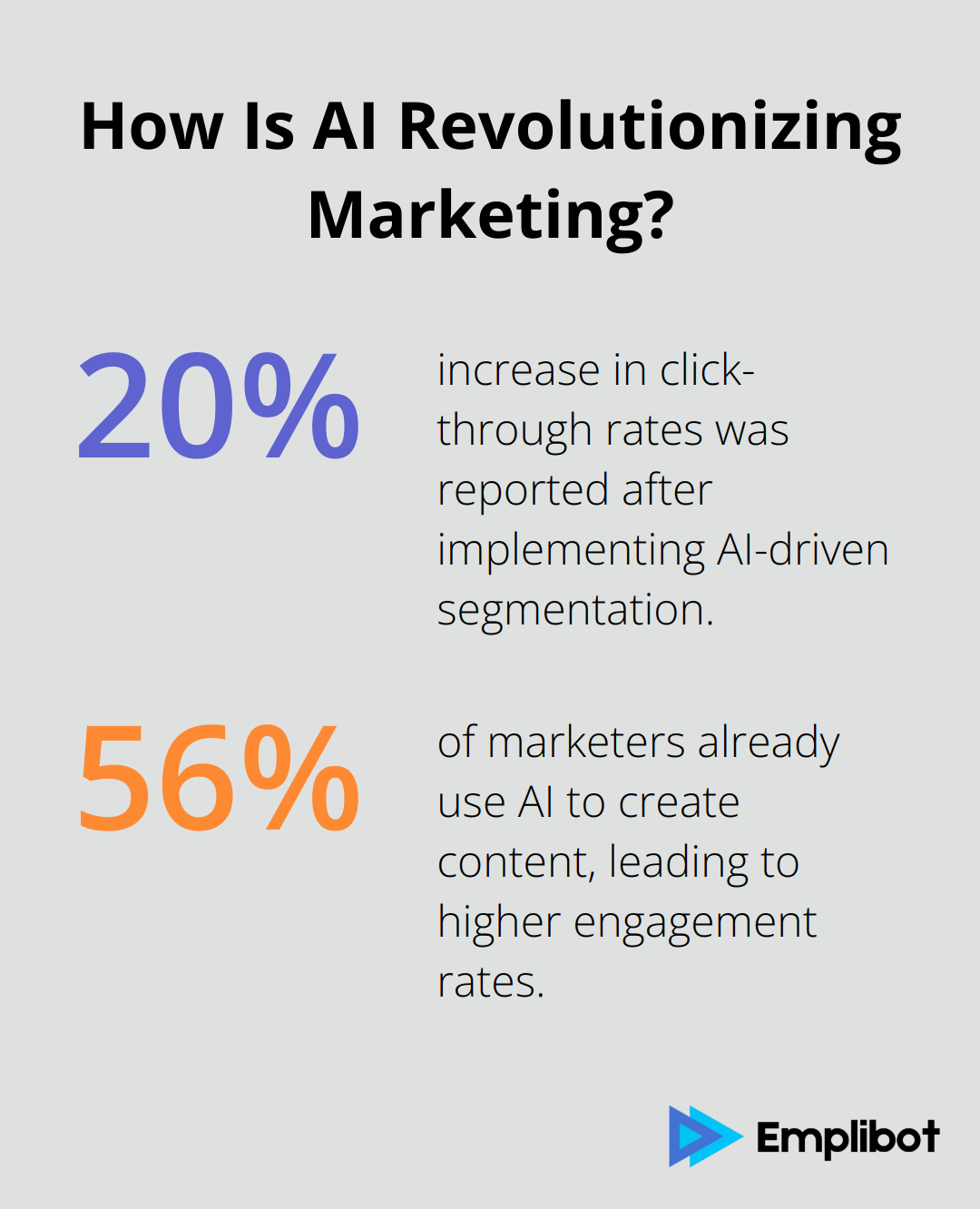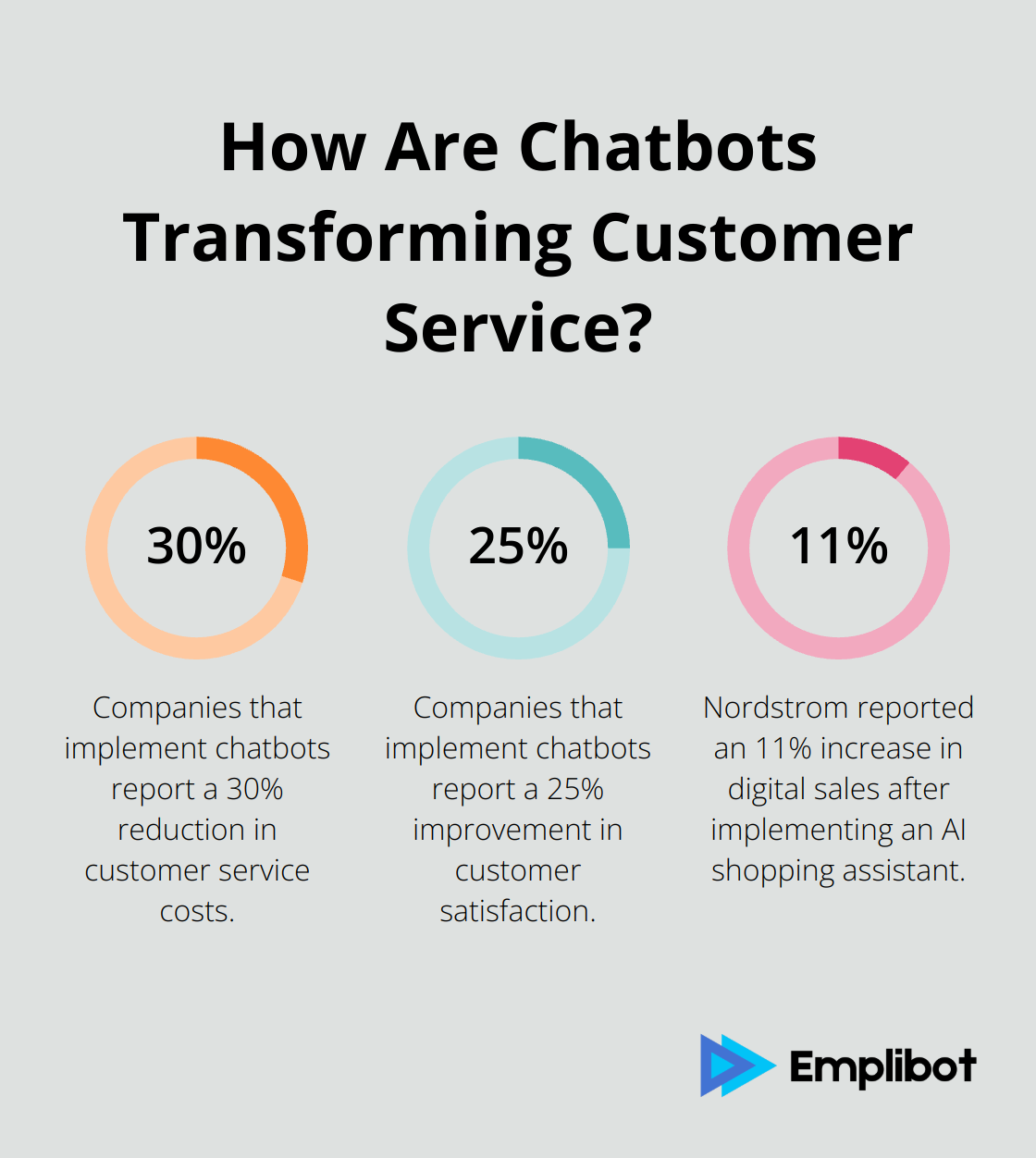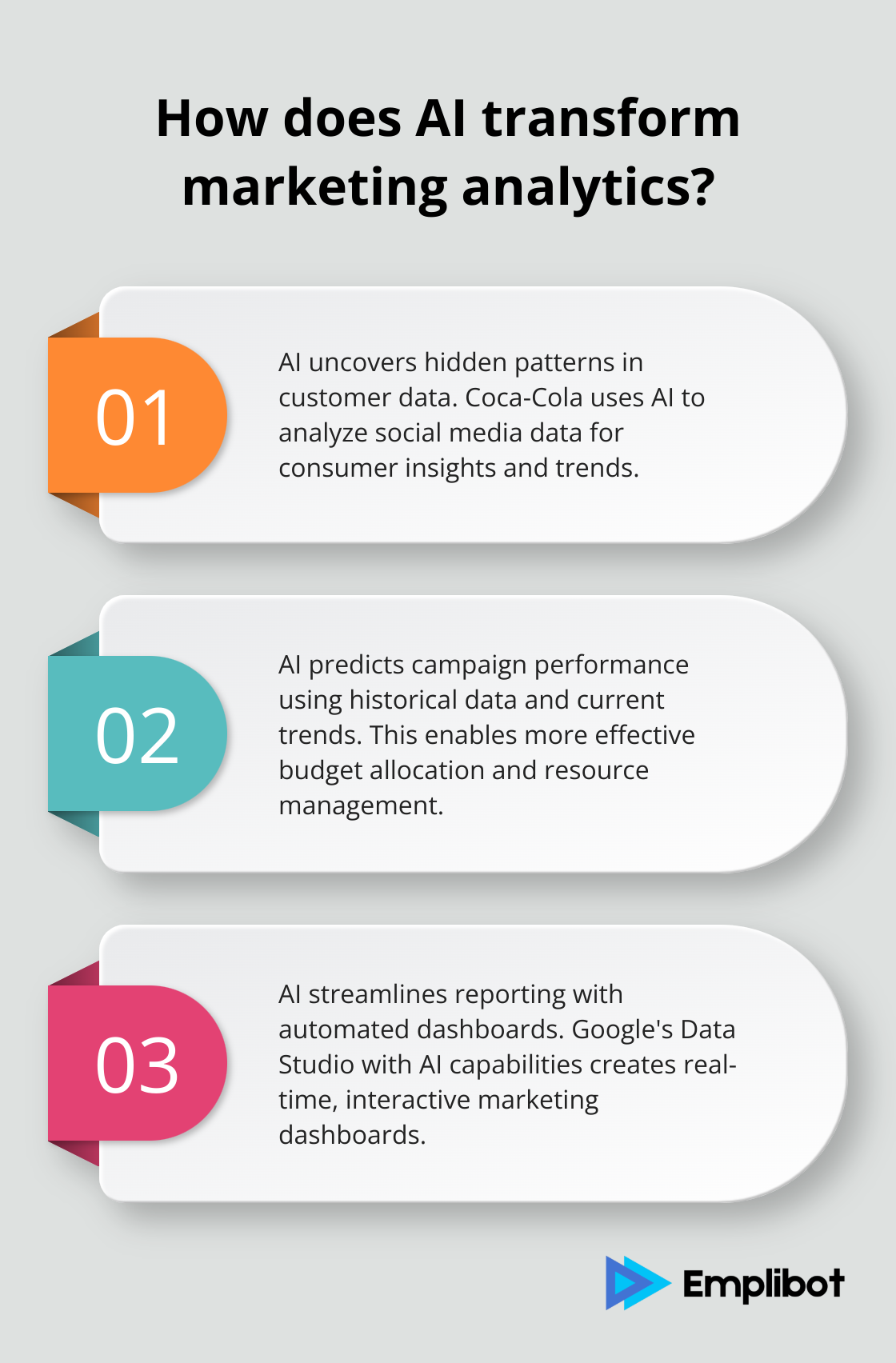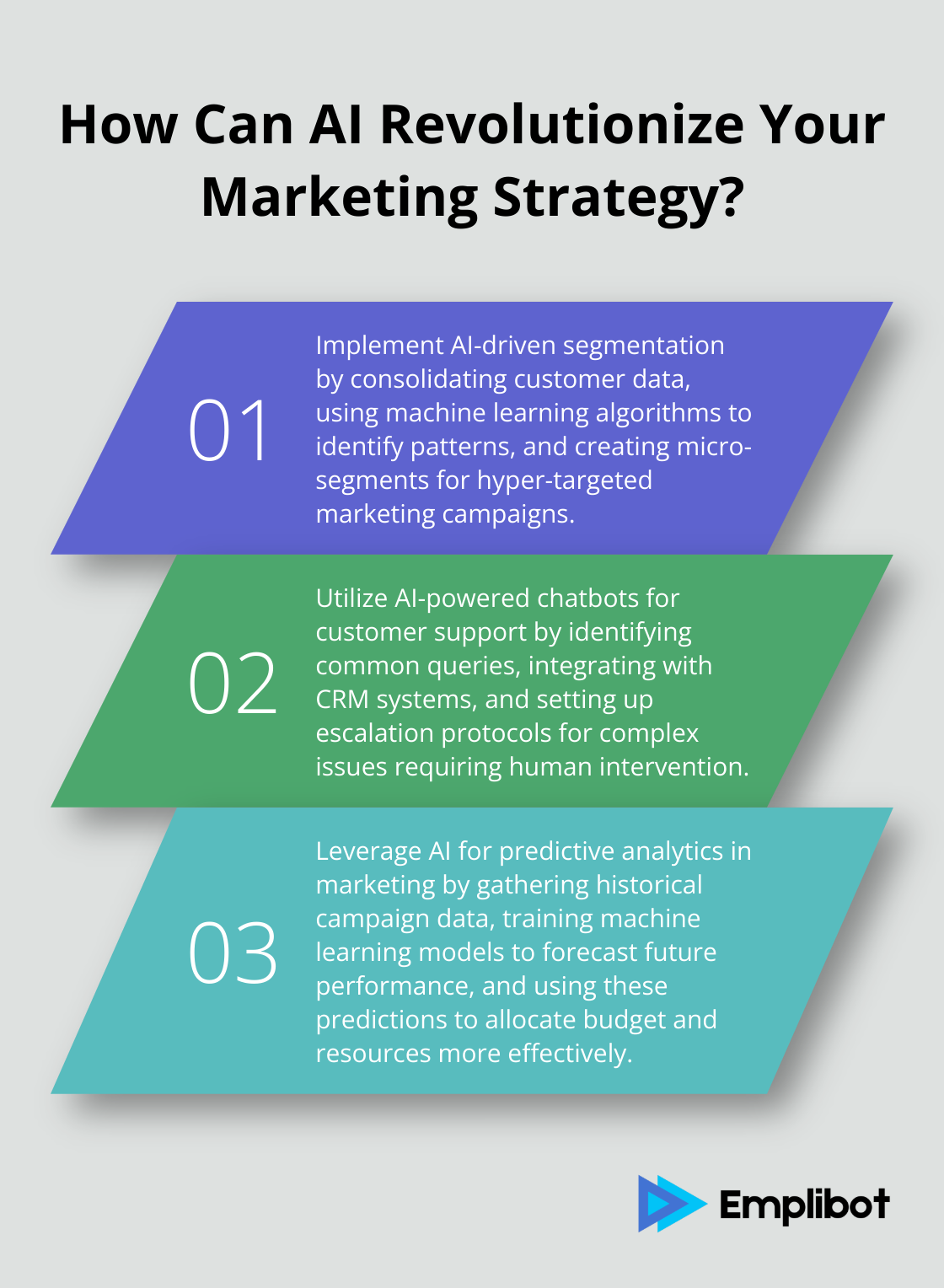At Emplibot, we’ve seen a surge in companies using AI for marketing success. Artificial intelligence is revolutionizing how businesses connect with their customers and optimize their marketing efforts.
From personalized content creation to advanced analytics, AI is transforming every aspect of marketing strategy. In this post, we’ll explore the most effective ways companies are leveraging AI to boost their marketing performance and drive growth.
How AI Personalizes Marketing
AI-powered personalization transforms marketing strategies across industries. Companies that use AI for personalization see significant improvements in customer engagement and conversion rates.
Smarter Customer Segmentation
AI algorithms analyze vast amounts of customer data to create highly specific segments. This goes beyond traditional demographics, incorporating behavioral patterns, purchase history, and real-time interactions. A major e-commerce platform reported a 20% increase in click-through rates after implementing AI-driven segmentation.

To implement this, companies should:
- Consolidate customer data from various sources
- Use machine learning algorithms to identify patterns
- Create micro-segments for hyper-targeted marketing campaigns
These steps allow for campaigns that resonate with each group’s unique preferences and needs.
Dynamic Content Creation at Scale
AI revolutionizes content creation by generating personalized content in real-time. This includes everything from product descriptions to email subject lines and ad copy. A study by Salesforce found that 56% of marketers already use AI to create content, leading to higher engagement rates.
Companies can start by using AI-powered writing tools to generate variations of their marketing copy. They should test these against traditional content to measure performance. It’s important to maintain brand voice by fine-tuning the AI outputs.
Predictive Product Recommendations
AI algorithms predict what products or services a customer will likely be interested in next. This capability has become a game-changer for e-commerce and subscription-based businesses. Netflix’s recommendation system produces $1 billion a year as value from customer retention and engagement.
To implement predictive recommendations, companies should:
- Analyze customers’ purchase history and browsing behavior
- Use this data to train a machine learning model for relevant product suggestions
- Continuously refine the model based on customer interactions
This process improves accuracy over time and enhances the overall customer experience.
AI-powered personalization creates more relevant, engaging marketing experiences. It not only improves customer satisfaction but also drives tangible business results. As we move forward, let’s explore how AI is revolutionizing customer engagement through chatbots and conversational AI.
How Chatbots Transform Customer Engagement
AI-powered chatbots and conversational AI revolutionize customer engagement in marketing. These technologies offer round-the-clock support, streamline lead generation, and provide personalized shopping experiences. Let’s explore how companies use these tools to enhance their marketing efforts.
24/7 Customer Support Boosts Satisfaction
Chatbots provide instant, always-on customer support, which significantly improves response times and customer satisfaction. A study by Juniper Research found that chatbots will save businesses $8 billion annually by 2022. Companies that implement chatbots report a 30% reduction in customer service costs and a 25% improvement in customer satisfaction.

To implement effective chatbot support:
- Identify common customer queries and design responses
- Integrate chatbots with your CRM system for personalized interactions
- Set up escalation protocols for complex issues that require human intervention
AI-Driven Lead Generation and Qualification
Conversational AI excels at engaging potential customers and qualifying leads. These systems initiate conversations, ask relevant questions, and score leads based on predefined criteria. Drift has eliminated traditional lead generation forms on their website, opting instead for engaging chatbot interactions.
To leverage AI for lead generation:
- Create engaging conversation flows that capture key information
- Use AI to analyze conversation data and identify high-quality leads
- Integrate chatbots with your marketing automation tools for seamless lead nurturing
Personalized Shopping Assistance Increases Sales
AI-powered shopping assistants provide tailored product recommendations and guidance throughout the customer journey. These tools analyze browsing history, purchase patterns, and real-time behavior to offer relevant suggestions. Nordstrom reported an 11% increase in digital sales after implementing an AI shopping assistant.
To create effective AI shopping assistants:
- Integrate product catalogs and inventory data with your AI system
- Design conversation flows that guide customers through product selection
- Use machine learning to continuously improve recommendation accuracy
Companies can significantly enhance their customer experience, boost lead generation, and drive sales through these AI-driven engagement strategies. The next chapter will examine how AI revolutionizes marketing analytics and decision-making processes (providing marketers with unprecedented insights and capabilities).
How AI Transforms Marketing Analytics
AI revolutionizes marketing analytics, providing unprecedented insights and decision-making capabilities. This technology transforms marketing strategies and drives measurable results.
Uncovering Hidden Patterns in Customer Data
AI algorithms analyze vast amounts of customer data to uncover hidden patterns and correlations. These insights enable marketers to make data-driven decisions and create more effective campaigns. Coca-Cola is using AI to better understand consumers and market dynamics by gathering and processing insights from social media data, which helps them identify emerging trends and consumer preferences.

To leverage AI for advanced data analysis:
- Consolidate data from various sources (CRM, social media, website analytics)
- Use machine learning algorithms to identify patterns and segments
- Apply these insights to refine targeting and messaging strategies
Predicting Campaign Performance with AI
AI-powered predictive analytics allows marketers to forecast future campaign performance based on historical data and current trends. These tools analyze historical data and current trends to predict outcomes with remarkable accuracy.
To implement predictive analytics in your marketing:
- Gather historical campaign data and relevant external factors
- Train machine learning models on this data to predict future performance
- Use these predictions to allocate budget and resources more effectively
Streamlining Reporting with AI-Powered Dashboards
AI automates the creation of marketing reports and dashboards, which saves time and provides real-time insights. These tools can pull data from multiple sources, analyze it, and present it in easy-to-understand visualizations. Google’s Data Studio (enhanced with AI capabilities) allows marketers to create interactive dashboards that update in real-time.
To implement AI-powered reporting:
- Identify key performance indicators (KPIs) for your marketing efforts
- Use AI tools to automate data collection and analysis
- Create customized dashboards that provide actionable insights at a glance
The Future of AI in Marketing Analytics
As AI continues to evolve, we can expect even more sophisticated analytics capabilities. Natural language processing will allow marketers to query data using conversational language, which makes insights more accessible to non-technical team members. AI will also play a larger role in attribution modeling, providing more accurate insights into the customer journey.
AI-powered marketing analytics isn’t just about crunching numbers – it provides actionable insights that drive real business results. These tools help marketers make more informed decisions, optimize their strategies, and achieve better ROI on their marketing investments.
Final Thoughts
AI has transformed marketing, providing companies with powerful tools to enhance personalization, customer engagement, and data-driven decision-making. We expect to see more sophisticated natural language processing and the merger of AI with augmented reality, creating immersive personalized experiences. AI will also play a larger role in content creation, potentially generating entire marketing campaigns with minimal human input.

Companies that want to implement AI in their marketing strategies should start with a clear understanding of their goals and current capabilities. They should identify areas where AI can have the most impact, such as customer segmentation or predictive analytics. It’s also important to invest in quality data collection and management, as AI systems rely on high-quality data to function effectively.
At Emplibot, we’ve witnessed how companies using AI for marketing achieve remarkable results. Our platform automates content creation and distribution, helping businesses increase traffic, leads, and sales without extensive manual effort. Companies that embrace these technologies will position themselves to thrive in an increasingly competitive landscape.

